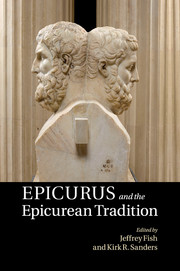Book contents
- Frontmatter
- Contents
- Acknowledgements
- Note on Abbreviations
- List of Contributors
- 1 Introduction
- 2 Autodidact and student: on the relationship of authority and autonomy in Epicurus and the Epicurean tradition
- 3 Epicurus' theological innatism
- 4 Epicurus on the gods
- 5 Not all politicians are Sisyphus: what Roman Epicureans were taught about politics
- 6 Epicurean virtues, Epicurean friendship: Cicero vs the Herculaneum papyri
- 7 Cicero's use and abuse of Epicurean theology
- 8 The necessity of anger in Philodemus' On Anger
- 9 Philodemus, Seneca and Plutarch on anger
- 10 Philodemus and the fear of premature death
- Bibliography
- General index
- Index of passages
4 - Epicurus on the gods
Published online by Cambridge University Press: 01 June 2011
- Frontmatter
- Contents
- Acknowledgements
- Note on Abbreviations
- List of Contributors
- 1 Introduction
- 2 Autodidact and student: on the relationship of authority and autonomy in Epicurus and the Epicurean tradition
- 3 Epicurus' theological innatism
- 4 Epicurus on the gods
- 5 Not all politicians are Sisyphus: what Roman Epicureans were taught about politics
- 6 Epicurean virtues, Epicurean friendship: Cicero vs the Herculaneum papyri
- 7 Cicero's use and abuse of Epicurean theology
- 8 The necessity of anger in Philodemus' On Anger
- 9 Philodemus, Seneca and Plutarch on anger
- 10 Philodemus and the fear of premature death
- Bibliography
- General index
- Index of passages
Summary
In this chapter, I defend (once again) the view that the Epicurean gods are real, in the sense that they exist as atomic compounds and possess the properties that pertain to the concept, or prolêpsis, that people have of them. The contrary view – that the Epicurean gods have no objective existence, and that the notion of them is a consequence of ‘psychological processes…within the human soul’, was proposed in the nineteenth century and revived in the twentieth by Jean Bollack; more recently, it has received support from Long and Sedley and Dirk Obbink, and, most forcefully, in the chapter by David Sedley in this volume. The physical existence of the gods has been reasserted, in turn, by Jaap Mansfeld, Gabriele Giannantoni, Maria Carolina Santoro and Michael Wigodsky.
Given that Epicurus, in the Letter to Menoeceus (123–4), flatly declares that ‘there are gods’ (θεοὶ μὲν γὰρ εἰσίν), and that this dictum is echoed by all subsequent Epicureans who have pronounced on the matter, I venture to say that no one would ever have proposed that they were mere ‘psychological processes’ or ‘thought-constructs’, had it not been for two difficulties that appear to beset the Epicurean theory. Both are evident in the same passage from Epicurus' Letter to Menoeceus.
- Type
- Chapter
- Information
- Epicurus and the Epicurean Tradition , pp. 53 - 71Publisher: Cambridge University PressPrint publication year: 2011
- 12
- Cited by



